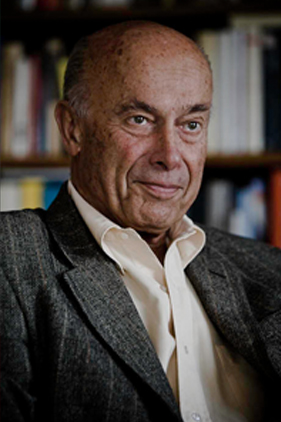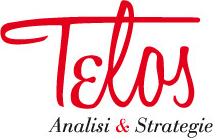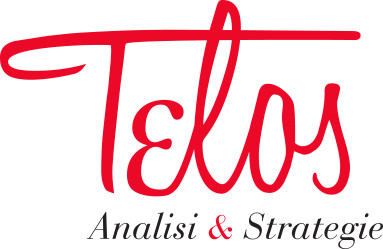February 2016, Year VIII, no. 2
Jas Gawronski
The nomad Jas
“Luck has played an important role in my career. In our lives we actively strive for some things, while others happen by chance. When events are positive and correspond to what we’re aiming for, then we say it’s luck. I’ve been very lucky.”
Telos: As a twenty-one year old journalist you took advantage of your trips to Warsaw and began to write for several Italian newspapers. You have also been a correspondent for RAI-TV in prestigious offices in New York, Moscow and Paris, nor has your entry into politics gone unnoticed: a MEP for five parliamentary terms, a Senator of the Italian Republic, and spokesperson for Silvio Berlusconi when he first became Prime Minister (1994). And yet you say you are not ambitious. What is the secret behind this brilliant career?
Jas Gawronski: Luck has played an important role in my career. In our lives we actively strive for some things, while others happen by chance. When events are positive and correspond to what we’re aiming for, then we say it’s luck. I’ve been very lucky. For example, when I met Ruggiero Orlando at the beginning of my career. He’s the one who sent me to New York as Enzo Biagi’s assistant. Back then, assistants did all the work. I organised trips, made appointments, etc. Amongst other things, I remember that since Biagi didn’t speak English he let me do a lot of the interviews. That’s how Ruggiero Orlando realised that I actually did most of Biagi’s work and called me to work at Rai. So I began working there as his deputy correspondent. It was my big break and set me on my way to achieving my greatest goal: to become a journalist. Not something that came easily, because many in my family didn’t approve of my choice. For example my grandfather, Alfredo Frassati, a wonderful man, founder and owner of the newspaper La Stampa. When I was about 16-17 I began to talk about becoming a journalist; my grandfather was staunchly against it saying that journalism “could no longer be considered a serious job”. Those were the sixties. Goodness knows what he’d say today! I had to overcome several hurdles to achieve my goal. When I went to Poland on my first assignments I didn’t tell my grandfather the truth, instead I told him I’d gone to find a steady job!
Any of your fellow journalists would kill to meet half the number of the people you’ve interviewed. Fidel Castro, Malcolm X and Margaret Thatcher, to name but a few. Not to mention your meetings with John Paul II which you talk about in your recent book “A cena dal Papa e altre storie” [Dining with the Pope and other stories]. What unpublished surprises will your readers find in the book?
They’ll find some statements by the Pope that discretion dictated were never published because they were personal opinions about important figures. Nothing that will change the course of history, but will to a certain extent help to paint a more complete picture. For example, when we talked about the great Europeists De Gaspari and Schumann he smiled and said slightly ironically, “they’re all Christian Democrats”. I was lucky enough to dine with John Paul II more than once. After we’d met several times I asked - and he agreed - if I could record our conversations because they were so interesting, not just for those who dined with us (apart from the Pope and myself, his secretary always ate with us). So the next time I arrived with a microphone and we recorded the conversation. I remember I spent the whole night transcribing our conversation! At seven the next morning the Pope’s secretary called me and said: “The Pope would prefer last night’s conversation to remain private”. I hesitated for a moment deciding whether or not to respect his request, because I could have published it anyway, but in the end I obeyed. And a good thing I did, because the next interview was even more interesting. The Pope forgot he was being recorded and spoke freely. My interviews with the Pope - one in 1989, initially discarded, and the other in 1993 - were in a certain sense very novel and different from other papal interviews because we didn’t talk about religious issues. I spoke only about politics with John Paul II: East-West relations, communism and Europe. It was a first. The rest of the book is full of my meetings with other great historical figures, Fidel Castro, Sabin, Lukàcs the great philosopher. Instead other chapters describe countries I’ve visited, for example North Korea where I’ve been five times. It’s very different to any other country, it is governed by an extremely cruel communist dictatorship. Amongst other things, it is a masterpiece of impenetrability. The authorities have managed to make it completely impenetrable and have cut it off from everything else. With the opportunities now provided by the web, cutting off a country like that from the rest of the world is a masterpiece of technique, control and oppression.
You have said: “Many situations and many individuals with their ideas, projects, pettiness and abstruseness have persuaded me that history is too human and we should not abstractly assign it principles that are too rigid. I’ve learnt to be indulgent and relative”. What led you to this conclusion?
I believe we should never pass final judgements, because we’ve all got many different sides to our character. I remember when I met Fidel Castro. Twice for three hours, from midnight to three in the morning. Many people (including some of my very dear friends) accused me of giving him an easy time. I admit I was smitten by the man and his strong personality. The leader of a small island in the Caribbean who for fifty years held in check a great political power - the United States - and had an enormous influence over all the other Latin American countries. Yes, he was a dictator, but a special kind of dictator. Our meetings convinced me he was in absolute good faith and that he didn’t see himself as a dictator. He thought he was doing all he could for Cuba. And he did, but he also did many bad things pointed out by his adversaries and opponents, many of which are still in prison even as we speak. We can’t compare him to a Latin American dictator with a bank account in Switzerland and money stashed here and there. That’s why I say we shouldn’t judge and should keep an open mind about everything. If we reason along these lines, then I believe Castro is a good example of what I’m saying.
Up until a year ago you were President of the Quadriennale in Rome. As soon as you were nominated, you immediately said you were not an art connoisseur, but that a President “must be a good organiser”. After four years, are you still of the same opinion?
Of course I am! And if you’re an art expert, then better still! But it’s not so important, because a President should surround himself with specialists in various fields if he wants to do his job properly which in this case was to organise a Quadriennale. Unfortunately I was unable to do my job due to lack of funds, which was rather frustrating. But it was an opportunity to discover a whole world I didn’t know before. I met artists, people with that extra something, who go through life with other principles. People for whom beauty is a real, significant value. Beauty can be anything, a stone or a piece of music. And I’ve always shared that idea.
Editorial
To meet Jas Gawronski and spend some time with him doing nothing more than what appears to be a quiet chat, is a truly unique experience. You expect great elegance, charm and an ability to analyse people and events. So no surprises, right? Wrong. There are surprises galore. An unexpected lightness and simplicity. A truly unique sense of self shines through when he talks about his life, a life he unhesitatingly defines as lucky: “I’ve been very lucky”. And yet, after listening to his stories we wonder what role intelligence played in taking advantage of all these opportunities, and to what extent his undisputed talent and skills contributed to his success. A lot, we believe. Gawronski once said that when he looked back he often saw himself as being in the right place at the right time and defined his intelligence as “linked to the concept of space”. Everything in his book is historically documented: the new way in which the Pope, or is it the papacy, communicates? A media figure such as Pope Francis would perhaps have been unthinkable without John Paul II and his decision to talk - at table with the clinking of glasses and cutlery - about very secular issues such as politics and history rather than religious issues. North Korea says it’s now a nuclear power? Gawronski reveals he’s visited the most inaccessible country in the world five times. Détente between Cuba and the USA? Gawronski describes Castro as a man who, when impertinently asked why he always wore his guerrilla uniform, retorted: “Have you ever asked the Pope why he always wears his white robes?” He is a special kind of journalist whose portraits of the greats of this world, and the way he interprets his job, express the essence of what journalism is all about. Today his book “A cena dal Papa e altre storie” [Dining with the Pope and other stories] gives readers an insight into his approach. In the learned introduction, Enzo Bettiza, his fraternal friend, writes: “pressed by a more Slav than Latin restlessness, the nomad Jas was to appear next to the most important and diverse figures of our age”. At the end of the interview, Gawronski reveals his frustration at having failed to organise a Quadriennale, and the fact he is not an art connoisseur. And yet delving into his past we discover that in the sixties in New York he used to be invited by Carla Pecci to her soirées with artists and intellectuals, including heavyweights such as Warhol and Rauschenberg. Now it’s time for you to read this very enjoyable conversation. You won’t regret it, there’s not a single word about Gianni Agnelli, we promise!

Jas Gawronski is a journalist and politician. Italian, of Polish origin, he was born in Vienna in 1936, before the Anschluss when Germany annexed Austria. His father, the ambassador and Polish prince Jan Gawronski met his mother in Berlin in the twenties: the remarkable Luciana Frassati, sister of Blessed Pier Giorgio Frassati. In 1925 his grandfather Alfredo Frassati, director and owner of La Stampa, had to abandon all he had, forced by the Fascist regime to sell his newspaper and resign as director. Gawronski graduated in Law in 1958 and immediately began to work as a correspondent in Eastern Europe for the newspapers Il Giorno and La Gazzetta dello Sport. From 1962 to 1966 he worked with Enzo Biagi and Sergio Zavoli as a journalist for TV programmes about Vietnam, Taiwan, India, the United States and Eastern Europe produced by RAI. Then he became the RAI correspondent in New York (1966-1977), replacing Ruggero Orlando, and later in Paris (1977-1979), Moscow and Warsaw (1979-1981).
In 1985 he worked on political and scientific programmes (e.g., Big Bang) for the Fininvest TV networks. In the meantime he began to collaborate with the newspaper La Stampa, and later became a member of the Board of Directors. He has published several books, including: “Primi Piani” (1989), a series of interviews with world leaders, “Il Mondo di Giovanni Paolo II” (1994), with the first interview given by Karol Wojtyla, “Vinti e Vincitori” (1999) and “A cena dal Papa e altre storie” (2015). He won the Campione Prize for a reportage about Kabul, the Silver Microphone for his work on television and in 2015 the Estense Prize for Journalism, the Capalbio Prize and the Biagio Agnes Lifetime Award. He entered politics in 1981 as a MEP for the Partito Repubblicano Italiano, and was re-elected five times. From ‘94 to ‘95 he was the spokesperson for the Prime Minister Silvio Berlusconi and was later Senator of the Republic from ‘96 to ‘99. He left this office when he was re-elected to the European Parliament in 1999. From January 2011 to 2015 he was President of the Quadriennale in Rome.







SocialTelos